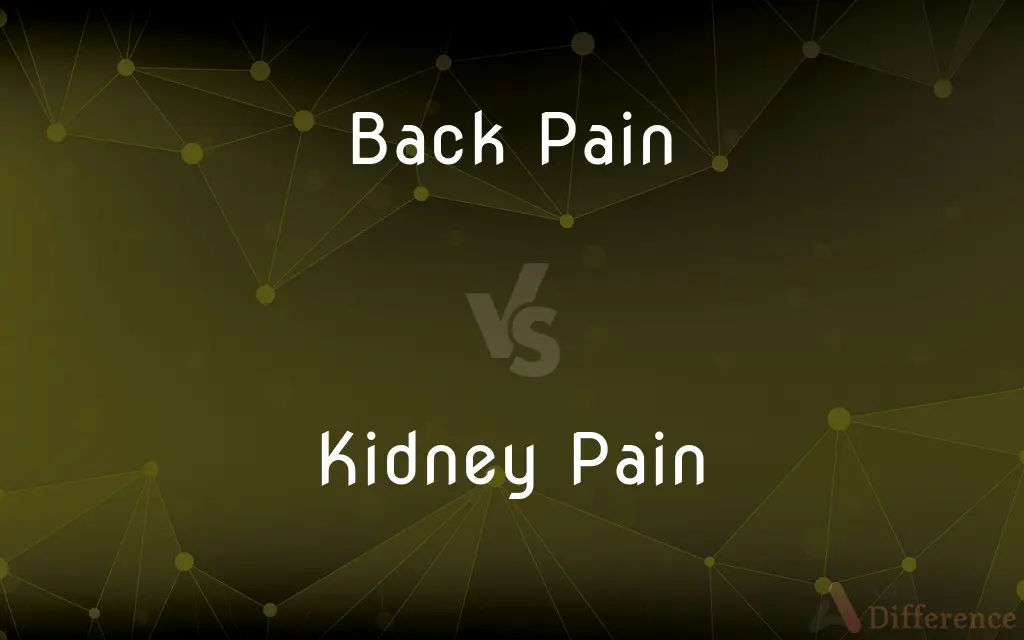Back Pain vs. Kidney Pain — What's the Difference?
Edited by Tayyaba Rehman — By Fiza Rafique — Published on December 13, 2023
Back pain is a discomfort in the muscles or spine, while kidney pain is discomfort originating from the kidneys, usually felt deeper in the back. Both can range from mild to severe.

Difference Between Back Pain and Kidney Pain
Table of Contents
ADVERTISEMENT
Key Differences
Back pain and kidney pain, while both manifesting in similar regions, have distinct origins and characteristics. Back pain typically stems from issues related to the muscles, ligaments, or vertebrae of the spine. Activities such as lifting heavy objects, poor posture, or spinal disorders can lead to back pain. Kidney pain, on the other hand, arises from conditions affecting the kidneys, such as kidney stones or infections.
The location of pain can provide clues as to its source. Back pain tends to be more generalized, spreading across the lower back and might be aggravated by movement or touch. Kidney pain is typically localized higher up, around the flank area, and may be felt deep beneath the ribs. It usually presents on one side, corresponding to the affected kidney.
While back pain can be a result of numerous factors, kidney pain is more indicative of specific kidney-related issues. For instance, a sharp, stabbing pain in the kidney region could be due to kidney stones. Persistent, dull aches might indicate an infection or other kidney conditions. Conversely, back pain can arise from muscular strain, herniated discs, arthritis, or several other causes.
It's essential to differentiate between back pain and kidney pain, primarily because of the implications for treatment. Treating back pain might involve physical therapy, medication, or lifestyle changes. Addressing kidney pain, however, could require a different approach such as antibiotics for infections or procedures to remove kidney stones.
Comparison Chart
Origin
Muscles, ligaments, or vertebrae
Kidneys
ADVERTISEMENT
Typical Location
Lower back, generalized
Flank area, deeper under the ribs
Possible Causes
Muscular strain, herniated discs, arthritis
Kidney stones, infections, kidney disorders
Pain Type
Can be sharp or dull, may be affected by movement
Sharp or dull, persistent, usually one-sided
Treatment Approaches
Physical therapy, medications, lifestyle changes
Medications, antibiotics, surgical procedures
Compare with Definitions
Back Pain
Pain resulting from spinal abnormalities or injuries.
A slipped disc might be the cause of his sudden back pain.
Kidney Pain
Pain typically felt deep in the back, below the ribs.
The pain under his ribs was diagnosed as kidney pain from an infection.
Back Pain
Pain that may be influenced by movement or specific positions.
Her back pain worsens when she stands for too long.
Kidney Pain
A deep, persistent ache in the flank region.
She suspected her kidney pain was due to an undiagnosed condition.
Back Pain
Discomfort originating from the spine or surrounding muscles.
Overexertion during workouts often leads to back pain.
Kidney Pain
Pain indicating potential abnormalities in kidney function.
Regular kidney pain prompted him to get a thorough renal check-up.
Back Pain
Aches in the back that can be acute or chronic.
Years of poor posture resulted in her chronic back pain.
Kidney Pain
Discomfort emanating from one or both kidneys.
The sharp, stabbing sensation indicated possible kidney pain.
Back Pain
Muscular tension or soreness in the back region.
Sitting for extended periods can exacerbate back pain.
Kidney Pain
Discomfort associated with kidney stones or infections.
Passing kidney stones can cause excruciating kidney pain.
Common Curiosities
Are kidney infections a cause for kidney pain?
Yes, kidney infections can cause a dull, persistent kidney pain.
Can exercises alleviate back pain?
Certain exercises, when done correctly, can help alleviate back pain.
What's the primary cause of back pain?
Back pain can arise from muscular strain, spinal issues, or ligament problems.
Is kidney pain felt in the lower back?
Kidney pain is typically felt higher up, deep under the ribs in the flank area.
Can poor posture lead to kidney pain?
Poor posture is more associated with back pain than kidney pain.
Are herniated discs a cause for back pain?
Yes, herniated or slipped discs can lead to back pain.
Can kidney pain be a sign of chronic kidney disease?
While kidney pain can be associated with various conditions, chronic kidney disease may not always present with pain.
Are kidney stones a common reason for kidney pain?
Yes, kidney stones can cause sharp, severe kidney pain.
How is kidney pain typically treated?
Treatment depends on the cause, ranging from antibiotics for infections to procedures for stones.
Does back pain always indicate a spinal problem?
Not always; back pain can arise from muscular issues, ligaments, or other factors.
Does kidney pain indicate a serious condition?
Kidney pain can indicate conditions like infections or stones, which require medical attention.
How can one differentiate between back pain and kidney pain?
Kidney pain is usually deeper, localized under the ribs, and may be one-sided, while back pain can be more generalized.
Is back pain common during pregnancy?
Yes, many pregnant women experience back pain due to increased strain and hormonal changes.
Can lifting heavy objects lead to back pain?
Yes, lifting heavy objects improperly can cause strain and back pain.
Can sitting for long durations lead to back pain?
Yes, prolonged sitting without proper support can contribute to back pain.
Share Your Discovery

Previous Comparison
Paste vs. Paste Special
Next Comparison
Scent Booster vs. Fabric SoftenerAuthor Spotlight
Written by
Fiza RafiqueFiza Rafique is a skilled content writer at AskDifference.com, where she meticulously refines and enhances written pieces. Drawing from her vast editorial expertise, Fiza ensures clarity, accuracy, and precision in every article. Passionate about language, she continually seeks to elevate the quality of content for readers worldwide.
Edited by
Tayyaba RehmanTayyaba Rehman is a distinguished writer, currently serving as a primary contributor to askdifference.com. As a researcher in semantics and etymology, Tayyaba's passion for the complexity of languages and their distinctions has found a perfect home on the platform. Tayyaba delves into the intricacies of language, distinguishing between commonly confused words and phrases, thereby providing clarity for readers worldwide.












































